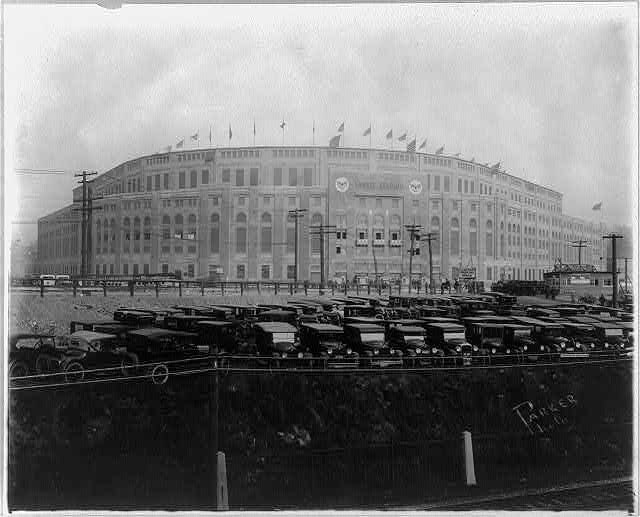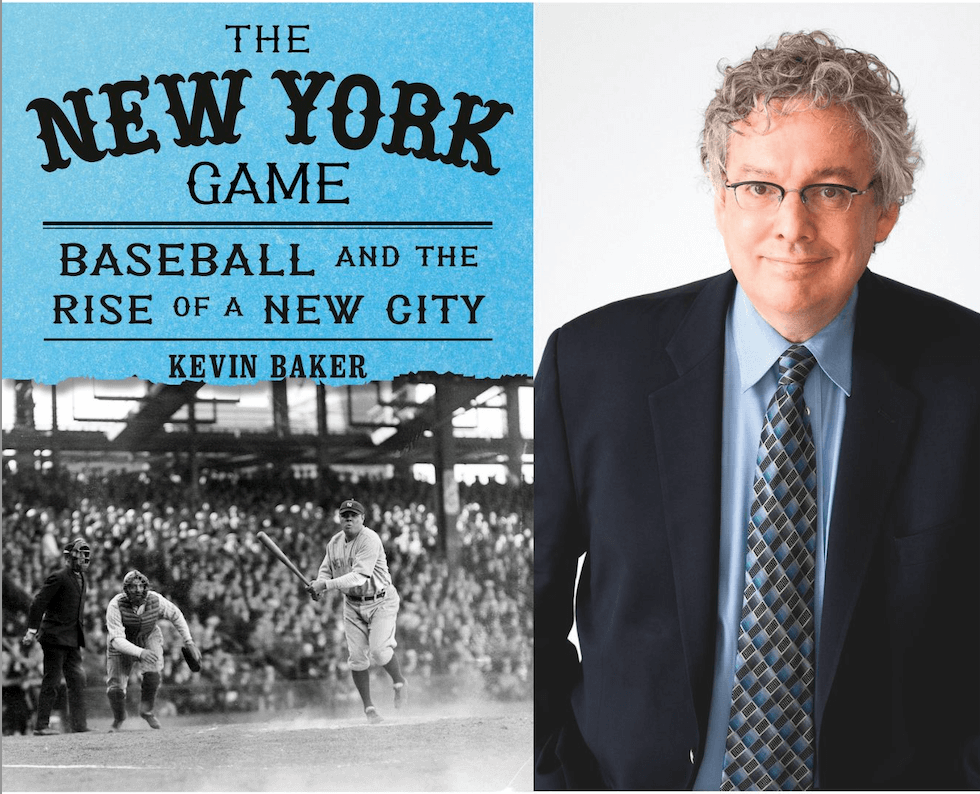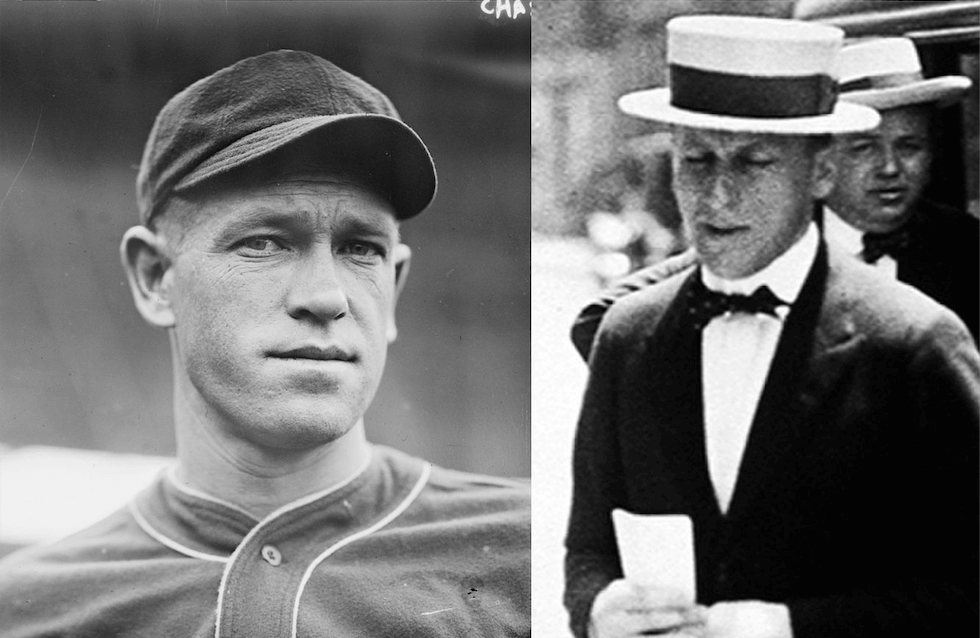Arnold Rothstein did fix the World Series and other Jewish facts from a historian of baseball and New York
Kevin Baker, author of ‘The New York Game,’ talks America’s pastime

Yankee Stadium circa 1925. Photo by Wikimedia Commons
For the first time since 2009, the New York Yankees have made it to the World Series, where they will play an erstwhile favorite team of New York Jews, the Los Angeles Dodgers, formerly of Brooklyn.
With the games set to start Friday in Dodger Stadium in Los Angeles and get bicoastal with game three at Yankee Stadium in the Bronx, the fabled New York history of America’s pastime deserves another look — even if, alas, the Mets, didn’t make the cut.
Kevin Baker’s The New York Game: Baseball and the Rise of a New City shares colorful tales of the early days on the diamond, where corrupt Tamany politicians controlled the sport and the legendary Arnold “The Brain” Rothstein rigged a World Series.
I spoke with Baker in the Forward office about the New York teams’ hunt for a Jewish star, Arnold Rothstein’s infamous World Series gambit and the curious endeavor of one of the first Jewish owners in American sports. The following conversation has been edited for length and clarity.
PJ Grisar: Part of the story of this book is the search for the Great Hebrew Hope of baseball.
Kevin Baker: The big three teams in New York all wanted a Jewish superstar. One of the great things about baseball was that early on, it was a real melting pot in New York. It was people who were gentlemen, people who were middle-class clerks, people who were working people and pretty much every ethnicity was allowed in, with the horrible exception that always goes on in America of people of color. You still had Black players in the majors in 1884, in the minors until 1898. But then the color wall goes up, and there are none until Jackie Robinson in ’47. But unlike many places around the country, there does not seem to have been any kind of attempt to exclude Jewish players. In fact, the first home run leader for the first two seasons in the first major league, the National Association, was a guy named Lipman Pike. His father had a haberdashery in Brooklyn. After he was done, he went back to the haberdashery and does that for his life.

But when you got the big three teams, the Yankees, the Giants and the Dodgers, they all hit upon the idea, eventually, of wanting “ethnics.” The Giants were always kind of the big Irish team. The Yankees, for instance, signed Italian players first — outstanding Italian players, Tony Lazzeri, Joe DiMaggio. But they all wanted to sign a great Jewish star. And it never quite worked out. The Giants brought in some guy named Mose Solomon, who was nicknamed immediately “The Rabbi of Swat,” but he didn’t work out. You had Moe Berg, who was a wonderfully complex character, but he’s a third-string catcher for a long time.
More interesting, probably for his espionage work.
Nicky Davidoff wrote a terrific book about it.
There’s also a not-so-hot movie with Paul Rudd.
It made Nicky some money, so good. But when Gehrig is first signed, they go to Miller Huggins, manager of the Yankees then, and say, “We signed this guy Lou Gehrig.” And the first thing he asks is, “is he Jewish?” hoping he is. He’s not. Then the Yankees spot Hank Greenberg. He was a star at James Monroe High School in the Bronx. And they make the mistake of taking him to a Yankees game. He sees Gehrig at first base and realizes “I will never play for them. I’m a first baseman.” So he signs with the Tigers, which is too bad. Ironically, New York does not get a great Jewish superstar until Sandy Koufax.
And then the Dodgers move to L.A.
After they move he comes into his own. Too bad.
One of the interesting Jewish characters you talk about is the owner of the Giants.
Andrew Freedman, who’s kind of fascinating. Bill James called him something like “George Steinbrenner on Quaaludes.” Totally dictatorial and fires managers left and right. But because he’s Jewish, gets constant antisemitic slanders to the point of this former ballplayer who was going to be traded away, calling him openly all sorts of antisemitic names. This goes on and on. It’s very open. And he finally sells the team.
He did this odd thing. He bought this big piece of land in the Bronx on the Grand Concourse, not far from where Yankee Stadium is, built this huge home for people who had means who may have fallen on hard times where they can retire and live in that gentility to which they had become accustomed. It’s like an old age home, only you’re supposed to dress for dinner. But it does become then, after the war, a nice place for a while for people coming over from Europe, who have lost family in the Holocaust and other things in World War II. For about 20 years or so, it houses them. And then eventually it finally empties out. Now they’ve kind of restored it and are trying to find a use for it. It was kind of just abandoned for a long time. But yeah, still up there in the Bronx.
Was he one of the first team owners who was Jewish in professional sports?
I think so. I was surprised by this. As far as I can tell, the first league anywhere ever, amateur sports in America, other countries, was the National Association, which is the first professional baseball league, started in 1871. And that’s where the whole idea of a league started. And a league, of course, is sort of a cartel. It sort of fit the business at the time. It’s who you’re excluding, as well as who you have in it.
Jacob Ruppert, who was a Tammany congressman for like four terms, but had also inherited a brewery — nice work if you can get it — he becomes the main owner of the Yankees, and he starts to really corporatize as a team and that really starts to bring baseball into the big time. Baseball’s profits are roughly akin, in 1920, to that of the sheet music industry. Harry Frazee, who owns the Red Sox, sells his players to finance No No Nanette and before that’s the musical Ladies First. Broadway makes a lot more money than baseball does. And that all starts to change with Ruppert.
The book shows that Tammany Hall was very involved in these early days.
Tammany took a chunk out of every sort of entertainment in the city, and you had to be on good terms with Tammany to do anything from running your back-of-the-saloon poker game, to running an amusement park or a ball team. And when you weren’t on good terms with the Tammany machine, they would do things like maybe drive a street through your ballpark. That happened to the original Polo Grounds, that happened in the first park the Yankees played in in the city. And Tammany also controlled crime, really. Having to deal with them, you opened yourself up to gamblers and to this sort of regular criminality.
So, did Arnold Rothstein rig the 1919 World Series?
Rothstein is a widely misunderstood character. He did not control a gang. He was not the strong-arm guy. What he did was finance gangs and finance pretty much any criminal venture he thought was a good idea. He financed gambling, and gambling was something that was part and parcel of baseball from the get go. American men just loved gambling, as Americans do today. They gamble on everything. Baseball was a very easy thing to gamble on. It became a thing where with the reserve clause, the major leagues were able to really keep down salaries for players. So it became sort of a constant thing where if you had a meaningless game at the end of the year, players would throw it and make some money off it.
The Sporting News, which was horrendously antisemitic at the time, blamed this all on Jews. It was not Jewish or anybody else — everybody was fixing games. But in any case, whenever there was kind of an upset in a big game, people would think maybe it had been fixed. This idea eventually attracted many of the Chicago White Sox, a whole faction of like eight guys basically, on the team, and they put the word out that they were for sale in the series during a trip to New York. And Rothstein made a deal with them.

But pretty soon, he notices that there are all kinds of rumors about this going on and all kinds of other gamblers are trying to kind of deal with them. He doesn’t like this. So he gets Hal Chase, who’s this incredibly corrupt player on the Giants, to bring a couple of these other gamblers to Rothstein at the Astor Hotel, which was the meeting place for everybody who was anybody in New York society. So it’s kind of weird — why are you bringing these gamblers here to fix the World Series in like Times Square? And at Rothstein’s table are somebody who’s just finished a term as chief of detectives for the NYPD and a respected judge. And Rothstein tells these gamblers, very loudly and openly. “You want to fix the World Series? Well, that’s never gonna happen. It’s impossible; there’s too much money and it’s too open and it would be un-American besides that.”
And they’re kinda like, “What? We’ve been brought here to hear this.” So they go back and then the next day, Chase shows up with some money and some instructions to go put down all the bets you can on the Cincinnati Reds. So Rothstein just wants to make an excuse for himself. Incredibly clever move. He’s brought into a grand jury hearing at some point, but he has this open excuse. Some of the most respectable people in New York had seen him say he is not involved with this. And he manages to avoid the rap. But yeah, they fixed the World Series.
How did they stop all the rampant gambling?
Baseball then decides, “We have a serious problem here.” They hire Judge Kennesaw Mountain Landis, this complete character, completely out of control, but he’s very good at playing the stern guy. And so he bans eight guys on the team. He bans other players throughout the ’20s — not everybody who gets caught gambling — but bans almost all of them. And this kind of establishes order and it really helps that at that moment you bring the most transformational athlete in sports history to New York: Babe Ruth. He’s this gargantuan, larger than life character. He’s perfect for the time and place and everybody is enthralled by him and that kind of takes this onus off baseball.
















